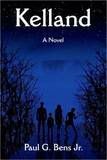 Casperian Books / September 2009
Casperian Books / September 2009
Reviewed by: Vince A. Liaguno
Kelland is likely to be the best book you might not read this year. With its non-descript cover, vague synopsis, and limited small press visibility, it would be easy for this compelling, beautifully written debut novel from native Kentuckian Paul G. Bens to be overlooked. And that would be a sincere shame.
Kelland is a gorgeous, genre-defying novel of heartrending truth, a work that builds slowly and confidently toward a page-turning climax that will leave you breathless in anticipation of the inevitable events one is never quite sure how will play out. This speculative fiction tour de force blends the concept of human interconnectivity with the devastating effects of childhood trauma and the limits of forgiveness – a literary fusion of Paul Thomas Anderson’s Magnolia meets Sleepers crossed with The Boys of St. Vincent.
Readers are introduced to five disparate strangers: a pair of Vietnamese brothers, a precociously devout altar boy, and a teenage boy whose web journals provide clues to a grieving mother trying to piece together the mystery behind an unthinkable tragedy. The common thread is the chameleon-like title character that appears to each of the characters as an agent of revelation, seemingly there to help each uncover their own truth. In the hands of a lesser writer, the concept of this conscience/spirit guide character could come across as gimmicky or ambiguous, but Bens ably pulls off this mingling of reality and otherworldliness without missing a beat. In its manifestation as a kindly priest helping an anguished mother unravel the mystery of her son’s suicide, the Kelland being explains the resiliency and flexibility of human interaction:
“We all exist in relation to others and we become what is needed in relation to them. I’m no different. I’ve been a friend, a musician, a little boy, a shoulder to cry on, a lover, a son, someone to guide the way. Different times, different people, different needs.”
Kelland is told in vignettes that flash forward and backward in time, during which Bens deftly develops each character by slowly and methodically peeling back the many layers of these seemingly separate stories. The generous payoff comes as these various narrative threads are pulled together in a masterful way that belies the fact that this is a debut novel.
Bens is a writer to watch. There are hints of literary experimentation at work here in this intricately and tightly-plotted novel that conjure up Michael Cunningham’s The Hours and Specimen Days. His prose is controlled yet – although there is nary an extraneous word to be found – descriptively lush:
“Music was chaos amongst order. Those black blotches meant nothing without the staff, and even then they were foreign to most, a puzzle, some secret code broken by many but understood by a few. Move just one of those notes up or down, adjust the key or alter the signature, and love could become hate, despair could be lifted, ugliness just might bloom into beauty. It was life really, the notes standing in for decisions and words, the clefs and the shapes revealing the feeling, the intent, and the attitude.”
If there’s one book you read this year that doesn’t shout from the bookshelves with a compelling cover or grab your attention with a slick book trailer, one that you read purely on recommendation, then let that book be Kelland. Gentle in approach but devastating in its humanity, Kelland will insinuate itself into your subconscious, surprise you with its maturity, and then pull the rug out from under you with its truth.
Purchase Kelland by Paul G. Bens Jr.